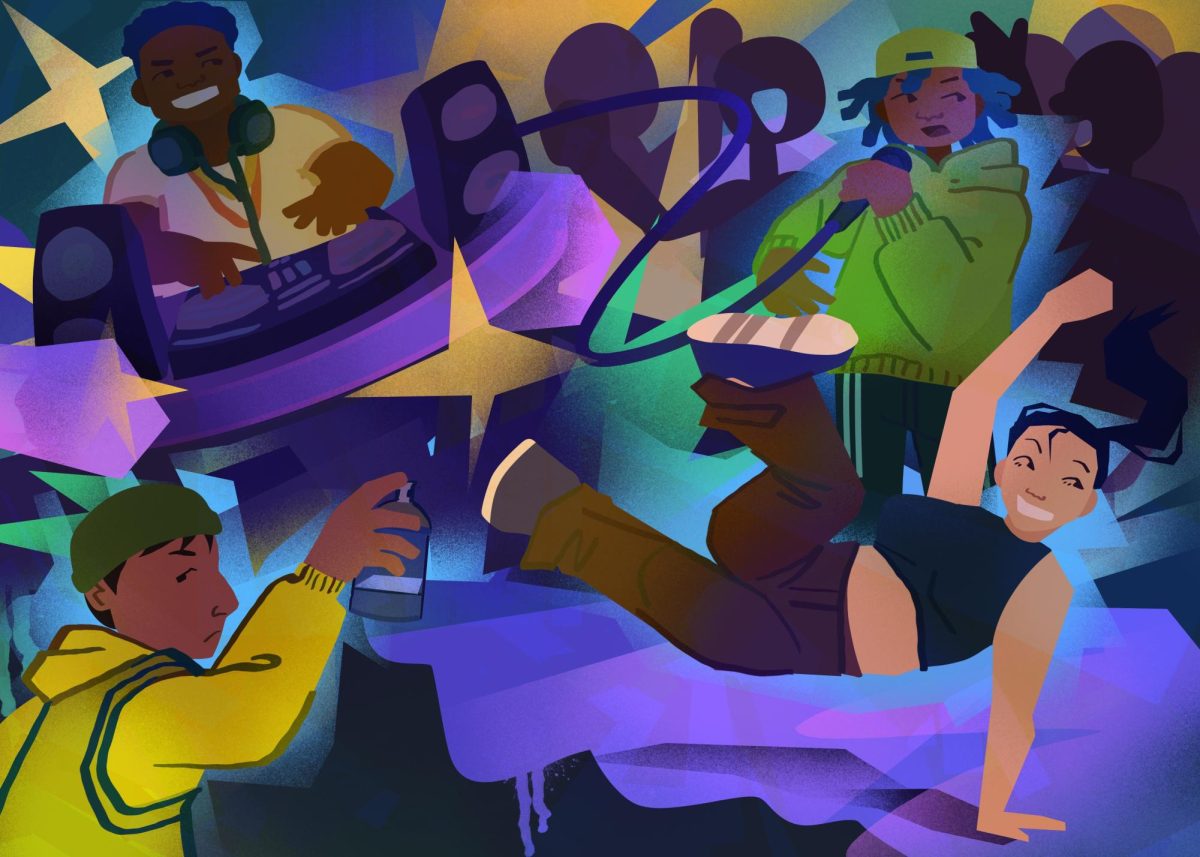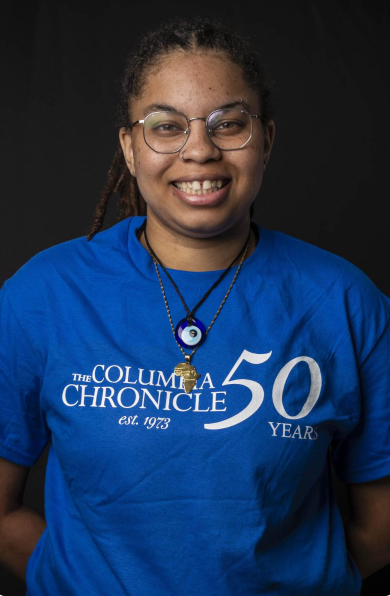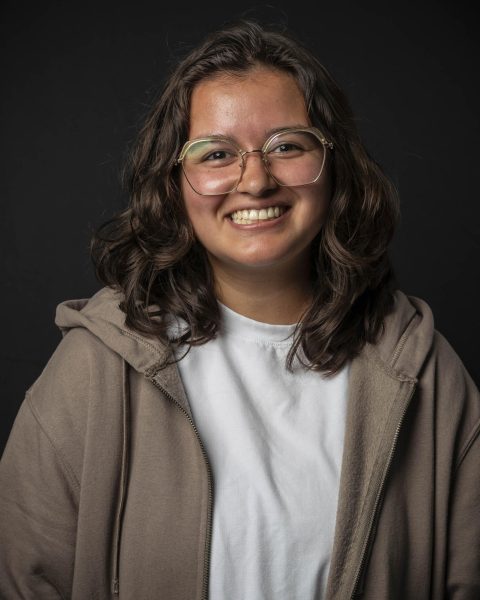THE HIP-HOP ISSUE
In 2017, a group of instructors from various hip-hop backgrounds came together to celebrate and educate students on hip-hop. The goal was to strengthen the connections students had to the genre before practicing it.
Six years later, the minor’s popularity has only grown, drawing students and practitioners from across the country to Columbia.
Amina Norman-Hawkins, instructor of “Hip-Hop: A Sonic History,” one of the founding group of teachers for the minor, said there was a lot of communication between students, alumni and community practitioners about what the program would look like.
“We were very intentional in making sure the program mirrored hip-hop culture, along with it being rooted in community which is what hip-hop is,” Norman-Hawkins said.
The minor, which is the only minor the Music Department offers, is interdisciplinary, reflecting the nature of hip-hop itself. The 20-credit minor is said to explore, “hip-hop history, aesthetics, ethics, pedagogy, music, dance, fashion, poetry, visual art and language,” and roots itself and its students in community engagement through student-led, practice-based learning.
The hip-hop community at Columbia spans decades, far longer than the minor has existed, and has pulled generational talent to the school since its inception.
Junior dance major Malika “Myka” Ocott said despite there being little physical presence of hip-hop in her hometown of Portland, Maine, she feels a personal connection to it through her family — her parents meeting during hip-hop’s first commercial boom period in the 90s.
“Sometimes I like to say I was born hip-hop because I feel like without it, there would be no other reason for them to get together,” Ocott said. “I wouldn’t be here if hip-hop didn’t exist.”
She said the minor was the sole reason she applied to Columbia and that it was harder to find dance schools that offered classes outside of ballet or modern-style dancing.
Hip-hop has only recently become a more accepted into the dance community, Ocott said.
“I saw that [Columbia] had a Hip-Hop Studies minor and I was like, ‘That’s exactly what I want to do,'” Ocott said. “I just want to focus on hip-hop.”
Another student with a longtime history with hip-hop, senior music business major Jaeya Bayani, left a well-known hip-hop hub on the west coast to study at Columbia.
Bayani grew up in California’s Bay Area and took inspiration from her dad, world-renowned popper, Jonathan “Bionic” Bayani, who helped her grow her passion.
“I grew up going a lot to cyphers. I had a lot of uncles and aunts that were both b-boys and b-girls, so I really grew up in that culture,” Bayani said.
The rapper and dancer said the hip-hop minor is a “great way to build community” and helps students try new things.
Hip-hop is “so prevalent today is because it brings people together and it gets people watching,” Bayani said. “It started in cyphers, whether we’re in a DJ, cypher, dance, rapping, we continued building off each other’s skills. I think that’s really what we have to come back to, you know.”
One form of community collectiveness is the way artists find their names.
Kelsa Rieger-Haywood, associate professor of instruction in the Dance Department, goes by “K-Soul” in the street dance community.
“A lot of times, it will happen when people show up for their first battle and they’re like, ‘Oh shit, I have to sign a name.’ So sometimes people are thinking of their own names or like turning to their crew if they’re part of a crew,” Rieger-Haywood said. “A lot of it is like a rite of passage from elders where you’re dancing around who will like sort of put a name upon you.”
Many use their aliases as a form of empowerment.
Rieger-Haywood said while learning is happening in the studio, the real challenges take place in the community itself, and if someone isn’t engaging ethically with the practice, it’s also a space that will “hold you accountable.”
Columbia’s Hip-Hop Studies minor is one of few college programs in the country dedicated to hip-hop, with other colleges like Ohio State University adding Hip-Hop Studies to its catalog ahead of their upcoming fall semester.
The chance to study hip-hop in Chicago specifically is a draw for students. While not the birthplace of hip-hop, Chicago has a lot to offer students that study here being the birthplace of genres that have often found themselves crossing paths like gospel and house, Bayani said.
Chicago has always had a large hip-hop community, seeing the rise of stars like Common, Kanye West, Juice WRLD and Chief Keef. Chicago’s most notable hip-hop fame was the creation of drill music in the early 2010s – a subgenre of hip-hop that quickly became a global sensation.
“Chicago is like the hidden place,” Bayani said. “I feel like Chicago is where you want to be if you want to be a good underground hip-hop artist.”
Jeff Derringer, a part-time instructor of “Digital Music Production I and II,” said although his course explores club music as a whole and includes genres outside of hip-hop, he admires the work it takes to be a hip-hop DJ, saying the skill is more “kinetic.”
“You’re dealing with much shorter songs in the hip-hop game and you have to mix faster,” Derringer said. “You don’t have two minutes to figure [the next song] out. You’ve got 20 seconds. It’s just a much more kinetic for your gear. Definitely as a hip-hop DJ, you’re more active with your hands.”
Derringer said he teaches up-and-coming DJ’s to be versatile with style and equipment, and to explore merging elements from other genres into their own work.
“Hip-hop producers can absolutely benefit from learning the other foundational genres, and they will probably find those sounds like creeping into their productions,” Derringer said. “I think it’s valuable for any music producer to know the foundations and the basics and the kind of as signposts of as many genres as they can.“
Hip-hop Studies help students engage with the genre in a “more ethical” way, Rieger-Haywood said.
Both students and teachers agreed that knowing the history influenced and empowered the way they engaged with the genre. Norman-Hawkins said classes like hers help dispel myths about hip-hop, something she feels is common among average listeners.
“It’s important for people to know the history, the roots of the history, the traditions, the practices, but also why we have hip-hop, why we do hip-hop,” Norman-Hawkins said. “Classes like mine are hip-hop, minor and practitioners and artists who are informed to share that information so that so that hip-hop stops getting a bad rap.”
This story has been updated.
Resumen en español:
La carrera de estudios de hip-hop de Columbia atrae a estudiantes de todas las disciplinas a la cultura, la historia y el arte del hip-hop.
Esta especialización, la única ofrecida por el departamento de música, es interdisciplinaria, reflejando la naturaleza del hip-hop. En 20 créditos, se explora “la historia, la estética, ética, pedagogía, música, baile, moda, poesía, arte visual y lenguaje” de este género. También se enfoca en la participación de la comunidad a través de un aprendizaje basado en la práctica y dirección por los estudiantes.




